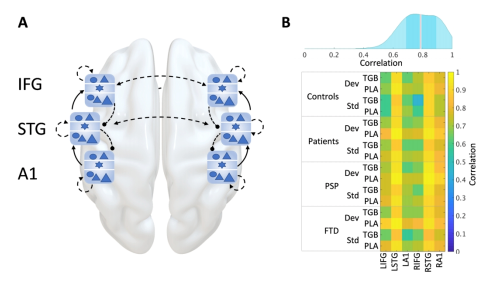Clinical syndromes caused by frontotemporal lobar degeneration (FTLD), including the behavioral variant frontotemporal dementia (bvFTD) and progressive supranuclear palsy (PSP), are pathologically distinct but share many behavioural, cognitive and physiological features. These shared features may in part occur from common deficits of major neurotransmitters like GABA. To further investigate the link between GABA deficits and bvFTD and PSP, 32 patients (17 bvFTD, 15 PSP) and 20 controls undertook a randomised placebo-controlled double-blind pharmaco-magnetoencephalography (MEG) study: two MEG sessions once on placebo and once on 10 mg of tigabine, an oral GABA reuptake inhibitor. Participants also completed neuropsychological tests. Researchers identified deficits in frontotemporal processing via conductance-based biophysical models of local and global neuronal networks. For instance, reduced top-down connectivity from frontal to temporal cortex was related to clinical measures of cognitive and behavioural change while GABA levels were reflective of this connectivity. This study highlights the potential of dynamic causal modeling to clarify mechanisms of human neurodegenerative disease. Utilising model-based physiology and targeted pharmacology (i.e., targeting neurotransmitter deficits) may be particularly effective for FTLD syndromes.
Adams, N. E., Hughes, L. E., Rouse, M. A., Phillips, H. N., Shaw, A. D., Murley, A. G., Cope, T. E., Bevan-Jones, W. R., Passamonti, L., Street, D., Holland, N., Nesbitt, D., Friston, K., & Rowe, J. B. (2021). GABAergic cortical network physiology in frontotemporal lobar degeneration. BRAIN. Online ahead of print. https://doi.org/10.1093/brain/awab097

 MRC Cognition and Brain Sciences Unit
MRC Cognition and Brain Sciences Unit


